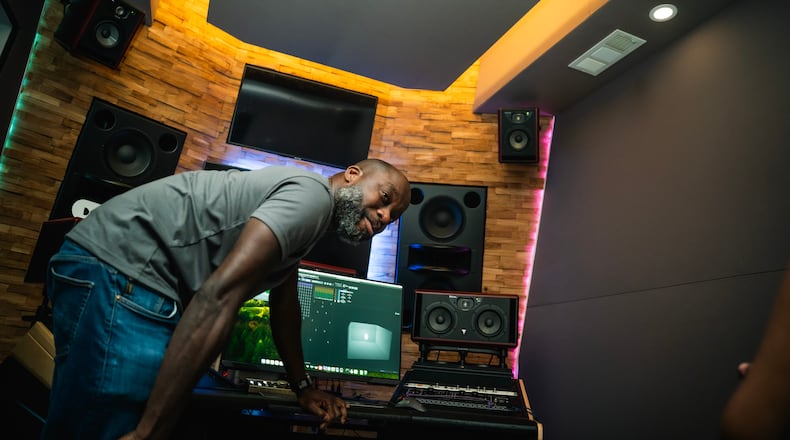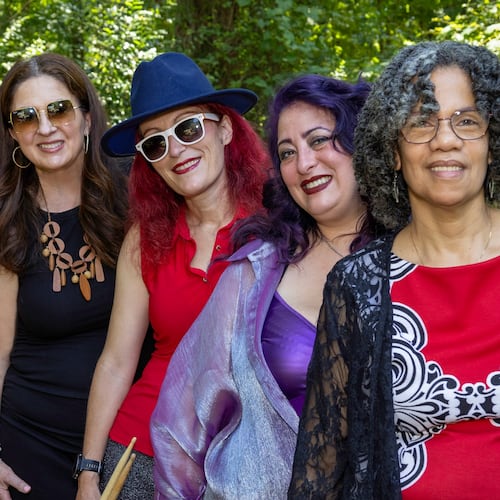In many ways, Leslie Brathwaite’s three decades in the music industry paralleled the rise of Atlanta as a central hub for music and creators.
In 1992, as Brathwaite was finishing his final months at Full Sail University in Florida, he read an article about Atlanta’s growing music scene.
“I remember saying to myself, ‘Well, I don’t want to go to Nashville because I don’t want to do country music. L.A. seems very expensive to live [in]. New York seems very expensive,” the mix engineer said. “Atlanta became my hyper focus.”
After graduating, Brathwaite came to Atlanta and checked into a Days Inn. He’d already secured an internship at Cat’s Paw Studios, but he really wanted to work at Dallas Austin Recording Projects (D.A.R.P.), a studio he’d read about in an article that also mentioned Antonio “L.A.” Reid and Kenneth “Babyface” Edmonds’ LaFace Records.
“It was so new, they didn’t even have anything in the phone book,” he said. “Nothing was listed.”
Brathwaite’s first responsibility at Cat’s Paw was to make copies of two-inch reel tapes. “One of the first reels that came over was a reel from Dallas [Austin’s] studio. On the back of the reel is the address, the number, all the stuff that I couldn’t find in the phone book,” he remembered.
Brathwaite visited D.A.R.P. on his lunch break, offering to clean a cluttered storage space to prove his usefulness. He never returned to Cat’s Paw.
In his 10 years working at DARP, Brathwaite mixed records for artists ranging from DJ Kizzy Rock to Joi, Outkast and Madonna. He was also an assistant engineer on Outkast’s 1994 debut album “Southernplayalisticadillacmuzik,” and by the time the rap duo released their fourth studio album “Stankonia” in 2000, Brathwaite had mixed all but one song on the project.
“The trajectory of our careers kind of grew together,” he says.
Credit: Jean-Christophe Bott
Credit: Jean-Christophe Bott
Brathwaite’s love for Atlanta culture, as well as his curiosity for music and technology has allowed him to remain one of today’s most in-demand mix engineers. In his role, he combines all of the recorded elements of a song, then balances them to conveys the sonic intent of the artists and record producers. His work is behind-the-scenes, and many fans might not be able to define it, but they certainly know a good mix when they hear it.
In the past four years alone, Brathwaite has worked on some of the most influential projects in hip-hop and popular music.
He mixed Cardi B and Megan Thee Stallion’s no. 1 hit “WAP.” He did so from his car, determined not to play the sexually explicit song in front of his kids while relegated to his home during the pandemic. He also handled mixing duties on their 2023 collaboration “Bongos.”
“Margiela,” a song featured on Usher’s 2024 album “Coming Home” as mixed by Brathwaite. The longtime Atlanta resident also mixed the song “Sweet Honey Buckiin’” for Beyoncé’s critically acclaimed album “Cowboy Carter.”
Rapsody’s album “Please Don’t Cry” stands out as Brathwaite’s favorite work to date. For the first time in his career, the mix engineer said he genuinely likes every song on an album he’s worked. He also has a more personal connection to the project: Brathwaite said Rapsody pushed the project’s deadline back from September 2023 to May 2024, to give him time to grieve the death of his brother.
Credit: Akili-Casundria Ramsess
Credit: Akili-Casundria Ramsess
Born in the U.S. Virgin Islands, Brathwaite knew he wanted to work in a recording studio at an early age. He grew up in a “very musical environment” and was introduced to various genres.
As a child, he’d spend school nights listening to his father’s diverse vinyl collection, which included records by recording artists ranging from Roberta Flack to Led Zeppelin, using headphones so his parents wouldn’t notice he was awake sometimes past 3 a.m. The practice laid the foundation for his love of mixing.
“You would hear things in the headphones that you just wouldn’t hear in regular speakers,” Brathwaite said.
Eventually, he began studying album credits and came across photos of a recording studio in an encyclopedia. “Something about it just looked like I’m supposed to be in one of those,” Brathwaite says. “It connected with my soul.”
Brathwaite also credits nontechnical lessons learned early in his career with his success.
He worked on early music from Atlanta stars TLC and Monica, whose 1995 debut single “Don’t Take It Personal (Just One of Dem Days)” he mixed. He remembers Dallas Austin instructing him to avoid giving the two iconic women recording acts a typical R&B sound.
“[Dallas] was like, ‘Don’t try to make Monica sound too pretty. Don’t try to make [TLC] sound too pretty. Mix them like hardcore hip-hop records. Make sure those beats are banging.’ That piece of advice and that talk that we had, to me, defined ‘90s R&B,” Brathwaite said.
Credit: TNS
Credit: TNS
Former LaFace executive Shanti Das met Brathwaite during his time at D.A.R.P. and refers to the mix engineer as a “studio head,” crediting his focus and dedication for his lasting career. “Being an intern for Dallas Austin gave him the shot he needed, and [he] never looked back,” she says.
Often in rooms with high-profile acts like Whitney Houston and Madonna, Brathwaite got to hear how they navigated their careers outside the recording booth, from negotiating record deals to creative differences with their record labels. “Those conversations are the valuable conversations,” he said. “It’s not the technical stuff, it’s not the buttons.”
These moments also reinforced that he made the right decision in 1992 when he decided to take a chance on Atlanta and its music scene.
“The reason why I know Madonna and whoever else is because they were coming here. They were coming here for the sauce. I met Cher because she came here to work with me. I didn’t have to go looking for that. I realized early on, even in the times when Atlanta kind of got a little cold and everybody was running to Miami and everybody was running to LA, we’re the source,” Brathwaite said.
“We had something special that has been super dominant. Atlanta, and the south in general, has had the longest reign in hip-hop.”
About the Author
Keep Reading
The Latest
Featured








